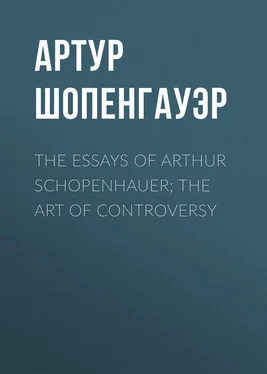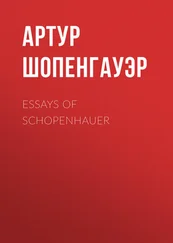Артур Шопенгауэр - The Essays of Arthur Schopenhauer; the Art of Controversy
Здесь есть возможность читать онлайн «Артур Шопенгауэр - The Essays of Arthur Schopenhauer; the Art of Controversy» — ознакомительный отрывок электронной книги совершенно бесплатно, а после прочтения отрывка купить полную версию. В некоторых случаях можно слушать аудио, скачать через торрент в формате fb2 и присутствует краткое содержание. Жанр: Философия, literature_19, foreign_antique, foreign_prose, на английском языке. Описание произведения, (предисловие) а так же отзывы посетителей доступны на портале библиотеки ЛибКат.
- Название:The Essays of Arthur Schopenhauer; the Art of Controversy
- Автор:
- Жанр:
- Год:неизвестен
- ISBN:нет данных
- Рейтинг книги:3 / 5. Голосов: 1
-
Избранное:Добавить в избранное
- Отзывы:
-
Ваша оценка:
- 60
- 1
- 2
- 3
- 4
- 5
The Essays of Arthur Schopenhauer; the Art of Controversy: краткое содержание, описание и аннотация
Предлагаем к чтению аннотацию, описание, краткое содержание или предисловие (зависит от того, что написал сам автор книги «The Essays of Arthur Schopenhauer; the Art of Controversy»). Если вы не нашли необходимую информацию о книге — напишите в комментариях, мы постараемся отыскать её.
The Essays of Arthur Schopenhauer; the Art of Controversy — читать онлайн ознакомительный отрывок
Ниже представлен текст книги, разбитый по страницам. Система сохранения места последней прочитанной страницы, позволяет с удобством читать онлайн бесплатно книгу «The Essays of Arthur Schopenhauer; the Art of Controversy», без необходимости каждый раз заново искать на чём Вы остановились. Поставьте закладку, и сможете в любой момент перейти на страницу, на которой закончили чтение.
Интервал:
Закладка:
Arthur Schopenhauer
The Essays of Arthur Schopenhauer; the Art of Controversy
The volume now before the reader is a tardy addition to a series in which I have endeavoured to present Schopenhauer's minor writings in an adequate form.
Its contents are drawn entirely from his posthumous papers. A selection of them was given to the world some three of four years after his death by his friend and literary executor, Julius Frauenstädt, who for this and other offices of piety, has received less recognition than he deserves. The papers then published have recently been issued afresh, with considerable additions and corrections, by Dr. Eduard Grisebach, who is also entitled to gratitude for the care with which he has followed the text of the manuscripts, now in the Royal Library at Berlin, and for having drawn attention – although in terms that are unnecessarily severe – to a number of faults and failings on the part of the previous editor.
The fact that all Schopenhauer's works, together with a volume of his correspondence, may now be obtained in a certain cheap collection of the best national and foreign literature displayed in almost every bookshop in Germany, is sufficient evidence that in his own country the writer's popularity is still very great; nor does the demand for translations indicate that his fame has at all diminished abroad. The favour with which the new edition of his posthumous papers has been received induces me, therefore, to resume a task which I thought, five years ago, that I had finally completed; and it is my intention to bring out one more volume, selected partly from these papers and partly from his Parerga .
A small part of the essay on The Art of Controversy was published in Schopenhauer's lifetime, in the chapter of the Parerga headed Zur Logik und Dialektik . The intelligent reader will discover that a good deal of its contents is of an ironical character. As regards the last three essays I must observe that I have omitted such passages as appear to be no longer of any general interest or otherwise unsuitable. I must also confess to having taken one or two liberties with the titles, in order that they may the more effectively fulfil the purpose for which titles exist. In other respects I have adhered to the original with the kind of fidelity which aims at producing an impression as nearly as possible similar to that produced by the original.
T.B.S.
February, 1896
THE ART OF CONTROVERSY
PRELIMINARY: LOGIC AND DIALECTIC
By the ancients, Logic and Dialectic were used as synonymous terms; although [Greek: logizesthai], "to think over, to consider, to calculate," and [Greek: dialegesthai], "to converse," are two very different things.
The name Dialectic was, as we are informed by Diogenes Laertius, first used by Plato; and in the Phaedrus, Sophist, Republic , bk. vii., and elsewhere, we find that by Dialectic he means the regular employment of the reason, and skill in the practice of it. Aristotle also uses the word in this sense; but, according to Laurentius Valla, he was the first to use Logic too in a similar way. 1 1 He speaks of [Greek: dyscherelai logicai], that is, "difficult points," [Greek: protasis logicae aporia logicae]
Dialectic, therefore, seems to be an older word than Logic. Cicero and Quintilian use the words in the same general signification. 2 2 Cic. in Lucullo: Dialecticam inventam esse, veri et falsi quasi disceptatricem. Topica , c. 2: Stoici enim judicandi vias diligenter persecuti sunt, ea scientia, quam Dialecticen appellant . Quint., lib. ii., 12: Itaque haec pars dialecticae, sive illam disputatricem dicere malimus ; and with him this latter word appears to be the Latin equivalent for Dialectic. (So far according to "Petri Rami dialectica, Audomari Talaei praelectionibus illustrata." 1569.)
This use of the words and synonymous terms lasted through the Middle Ages into modern times; in fact, until the present day. But more recently, and in particular by Kant, Dialectic has often been employed in a bad sense, as meaning "the art of sophistical controversy"; and hence Logic has been preferred, as of the two the more innocent designation. Nevertheless, both originally meant the same thing; and in the last few years they have again been recognised as synonymous.
It is a pity that the words have thus been used from of old, and that I am not quite at liberty to distinguish their meanings. Otherwise, I should have preferred to define Logic (from [Greek: logos], "word" and "reason," which are inseparable) as "the science of the laws of thought, that is, of the method of reason"; and Dialectic (from [Greek: dialegesthai], "to converse" – and every conversation communicates either facts or opinions, that is to say, it is historical or deliberative) as "the art of disputation," in the modern sense of the word. It it clear, then, that Logic deals with a subject of a purely à priori character, separable in definition from experience, namely, the laws of thought, the process of reason or the [Greek: logos], the laws, that is, which reason follows when it is left to itself and not hindered, as in the case of solitary thought on the part of a rational being who is in no way misled. Dialectic, on the other hand, would treat of the intercourse between two rational beings who, because they are rational, ought to think in common, but who, as soon as they cease to agree like two clocks keeping exactly the same time, create a disputation, or intellectual contest. Regarded as purely rational beings, the individuals would, I say, necessarily be in agreement, and their variation springs from the difference essential to individuality; in other words, it is drawn from experience.
Logic, therefore, as the science of thought, or the science of the process of pure reason, should be capable of being constructed à priori . Dialectic, for the most part, can be constructed only à posteriori ; that is to say, we may learn its rules by an experiential knowledge of the disturbance which pure thought suffers through the difference of individuality manifested in the intercourse between two rational beings, and also by acquaintance with the means which disputants adopt in order to make good against one another their own individual thought, and to show that it is pure and objective. For human nature is such that if A. and B. are engaged in thinking in common, and are communicating their opinions to one another on any subject, so long as it is not a mere fact of history, and A. perceives that B.'s thoughts on one and the same subject are not the same as his own, he does not begin by revising his own process of thinking, so as to discover any mistake which he may have made, but he assumes that the mistake has occurred in B.'s. In other words, man is naturally obstinate; and this quality in him is attended with certain results, treated of in the branch of knowledge which I should like to call Dialectic, but which, in order to avoid misunderstanding, I shall call Controversial or Eristical Dialectic. Accordingly, it is the branch of knowledge which treats of the obstinacy natural to man. Eristic is only a harsher name for the same thing.
Controversial Dialectic is the art of disputing, and of disputing in such a way as to hold one's own, whether one is in the right or the wrong — per fas et nefas . 3 3 According to Diogenes Laertius, v., 28, Aristotle put Rhetoric and Dialectic together, as aiming at persuasion, [Greek: to pithanon]; and Analytic and Philosophy as aiming at truth. Aristotle does, indeed, distinguish between (1) Logic , or Analytic, as the theory or method of arriving at true or apodeictic conclusions; and (2) Dialectic as the method of arriving at conclusions that are accepted or pass current as true, [Greek: endoxa] probabilia ; conclusions in regard to which it is not taken for granted that they are false, and also not taken for granted that they are true in themselves, since that is not the point.
Интервал:
Закладка:
Похожие книги на «The Essays of Arthur Schopenhauer; the Art of Controversy»
Представляем Вашему вниманию похожие книги на «The Essays of Arthur Schopenhauer; the Art of Controversy» списком для выбора. Мы отобрали схожую по названию и смыслу литературу в надежде предоставить читателям больше вариантов отыскать новые, интересные, ещё непрочитанные произведения.
Обсуждение, отзывы о книге «The Essays of Arthur Schopenhauer; the Art of Controversy» и просто собственные мнения читателей. Оставьте ваши комментарии, напишите, что Вы думаете о произведении, его смысле или главных героях. Укажите что конкретно понравилось, а что нет, и почему Вы так считаете.












